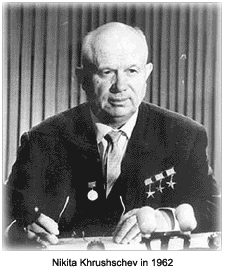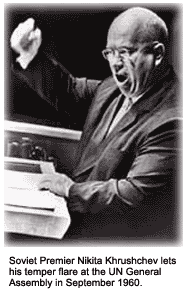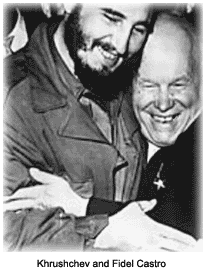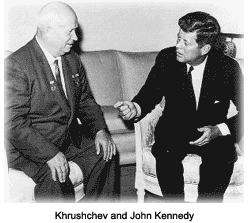Nikita Sergeyevich Khrushchev rose from the poverty of his youth to become the most powerful Russian in the Communist Party and the personification of the Cold War of the 1950s and early 1960s. He is probably best remembered for his antics and ill temper at meetings of the United Nations in the early 1960s, including the infamous “shoe-banging incident.”
The early days
Khrushchev was born in April 1894 in Kalinovka near Russia’s southwestern border with Ukraine. Due to near-impossible economic conditions in the rural area, the family moved to the industrialzed city of Yuzovka, Ukraine, in 1908. He soon got a job as a pipefitter working in the area’s coal mines.
The energetic young man became active in trying to establish trade unions and joined the Red Army following the Bolshevik revolution in 1917.
Up the ranks
Khrushchev fought in the Russian civil war (1918-1920) and gained favor with his superiors.
In 1925, he was graduated from a workers’ school that provided higher education for young adults to prepare them for management positions. For the next few years he held various Communist Party positions in Kiev.
By 1929, the party arranged for Khrushchev to attend the J.V. Stalin Industrial Academy, which produced factory management personnel.
Moving rapidly up the ranks of the party, he attained the rank of the first secretary of the Moscow party, and caught the eye of Joseph Stalin, the Soviet dictator. By 1939, he was selected to be a full member of Stalin’s Politburo.
Khrushchev’s involvement in World War II
Even though World War II started in 1939, Russia managed to stay out of it until June 1941 when Germany invaded Ukraine. Khrushchev, a top military advisor with a rank of lieutenant general, oversaw the evacuation of industrial equipment from Kiev before it was overrun by the Germans.
He helped organize a guerrilla army in Ukraine and the planning of the defense of Stalingrad (today called Volgograd).
In 1944, Russia pushed the Germans out of Ukraine and Khrushchev helped get war-ravaged farms, coal mines, and steel mills back into production.
Postwar power struggle
When Stalin died in March 1953, Georgi Malenkov became premier. In September, Khrushchev became first secretary of the entire country’s Communist Party.
Leery of Khrushchev’s growing power, such rivals as Lavrenti Beria, Lazar Kaganovich, and Vyacheslav Molotov, banded together to plot against Khrushchev.
During the power struggle, Beria was assassinated. In 1955, Malenkov resigned as premier, to be succeeded by Nikolai Bulganin.
 In February 1956, Khrushchev delivered a secret speech to the 20th Congress of the Communist Party denouncing Stalin and his atrocities — something that party members already knew about, but were hesitant to bring to light. That triggered a period of "destalinization" in which pictures and monuments of the former dictator were destroyed. Towns and cities renamed themselves to be rid of any reference to Stalin.
By assailing Stalin for the “violation of Leninist norms of legality,” Khrushchev began a period that would become known as the “Khrushchev Thaw.”
Khrushchev circumvented his rivals' plans by removing them from leadership positions within the party. Then, in March 1958, Khrushchev promoted himself to head of the Soviet government. That meant he now controlled both the party and the government.
The reign
In May 1955, Khrushchev helped push through an agreement called the Treaty on Friendship, Cooperation, and Mutual Assistance, or Warsaw Pact. It stated that “relations among the signatories were based on total equality, mutual noninterference in internal affairs, and respect for national sovereignty and independence.”
However, by attacking Stalin, Khrushchev caused a great rift in the communist world. China wanted a more aggressive military posture to deal with the West. Political disturbances led to uprisings against the Communist Party in Hungary and Poland. The Hungarian Revolution was crushed by Khrushchev by sending tanks and Soviet troops into the country.
The revolts, however, forced a change in Soviet thinking. What developed was an agreement to let the sovereignty of Eastern European nations take a greater role in self governing.
”Peaceful Co-existence”
To avoid a military confrontation with the West, Khrushchev put forth his “Doctrine of Peaceful Co-existence,” accompanied by the slogan “To catch up and overtake the West” in economic well-being, and an improvement in the Soviet Union's internal affairs.
Khrushchev’s domestic policies to raise living standards for his people worked for a time. A great deal of effort went into trying to increase grain and other produce production in Siberia. His government also tried to encourage the production of housing (a key element in the plan), clothing, household appliances, and furniture.
The Space Race
While military conflicts (fought by proxy client states) flared up and were later doused, the Soviet Union, and later the United States, were deeply involved in putting a man into space and eventually on the moon.
It was a source of national pride for Russians when, in October 1957, they launched Sputnik, the first artificial satellite to orbit the earth. The feat startled America into action.
The U-2 Spy Plane Incident
On May 1, 1960, an American U-2 reconnaissance plane, piloted by Francis Gary Powers, was shot down deep inside Russian territory. The Soviets demanded an explanation and an apology.
U.S. President Dwight D. Eisenhower disavowed any knowledge of the U-2 program and refused to apologize.
When the Soviets produced film and parts of the wreckage, the U.S. had to revise its earlier statements.
In February 1956, Khrushchev delivered a secret speech to the 20th Congress of the Communist Party denouncing Stalin and his atrocities — something that party members already knew about, but were hesitant to bring to light. That triggered a period of "destalinization" in which pictures and monuments of the former dictator were destroyed. Towns and cities renamed themselves to be rid of any reference to Stalin.
By assailing Stalin for the “violation of Leninist norms of legality,” Khrushchev began a period that would become known as the “Khrushchev Thaw.”
Khrushchev circumvented his rivals' plans by removing them from leadership positions within the party. Then, in March 1958, Khrushchev promoted himself to head of the Soviet government. That meant he now controlled both the party and the government.
The reign
In May 1955, Khrushchev helped push through an agreement called the Treaty on Friendship, Cooperation, and Mutual Assistance, or Warsaw Pact. It stated that “relations among the signatories were based on total equality, mutual noninterference in internal affairs, and respect for national sovereignty and independence.”
However, by attacking Stalin, Khrushchev caused a great rift in the communist world. China wanted a more aggressive military posture to deal with the West. Political disturbances led to uprisings against the Communist Party in Hungary and Poland. The Hungarian Revolution was crushed by Khrushchev by sending tanks and Soviet troops into the country.
The revolts, however, forced a change in Soviet thinking. What developed was an agreement to let the sovereignty of Eastern European nations take a greater role in self governing.
”Peaceful Co-existence”
To avoid a military confrontation with the West, Khrushchev put forth his “Doctrine of Peaceful Co-existence,” accompanied by the slogan “To catch up and overtake the West” in economic well-being, and an improvement in the Soviet Union's internal affairs.
Khrushchev’s domestic policies to raise living standards for his people worked for a time. A great deal of effort went into trying to increase grain and other produce production in Siberia. His government also tried to encourage the production of housing (a key element in the plan), clothing, household appliances, and furniture.
The Space Race
While military conflicts (fought by proxy client states) flared up and were later doused, the Soviet Union, and later the United States, were deeply involved in putting a man into space and eventually on the moon.
It was a source of national pride for Russians when, in October 1957, they launched Sputnik, the first artificial satellite to orbit the earth. The feat startled America into action.
The U-2 Spy Plane Incident
On May 1, 1960, an American U-2 reconnaissance plane, piloted by Francis Gary Powers, was shot down deep inside Russian territory. The Soviets demanded an explanation and an apology.
U.S. President Dwight D. Eisenhower disavowed any knowledge of the U-2 program and refused to apologize.
When the Soviets produced film and parts of the wreckage, the U.S. had to revise its earlier statements.
 On May 16, at the previously scheduled Paris Summit peace conference, Khrushchev again demanded an apology. When Eisenhower agreed to suspend the overflights but refused to apologize once again, Khrushchev withdrew from the conference, effectively ending any peace negotiations.
If the shoe fits . . .
Five months after the U-2 incident, the volatile Khrushchev — on the world’s largest political stage, the UN General Assembly — angrily denounced Lorenzo Sumulong, the leader of the Phillipine delegation, as “a jerk, a stooge, and a lackey of imperialism.”
At that point, Khrushchev furiously banged his shoe on the podium, earning him the nickname “Hurricane Nikita.”
Sumulong had questioned Khrushchev about his stance on western imperialism when the Soviets had, themselves, swallowed all of Eastern Europe.
The Berlin Wall
Further deepening the tensions of the Cold War, Khrushchev urged East Berlin officials to build a brick wall around West Berlin, cutting off all contact between citizens of East and West Berlin. The wall was completed in August 1961.
On May 16, at the previously scheduled Paris Summit peace conference, Khrushchev again demanded an apology. When Eisenhower agreed to suspend the overflights but refused to apologize once again, Khrushchev withdrew from the conference, effectively ending any peace negotiations.
If the shoe fits . . .
Five months after the U-2 incident, the volatile Khrushchev — on the world’s largest political stage, the UN General Assembly — angrily denounced Lorenzo Sumulong, the leader of the Phillipine delegation, as “a jerk, a stooge, and a lackey of imperialism.”
At that point, Khrushchev furiously banged his shoe on the podium, earning him the nickname “Hurricane Nikita.”
Sumulong had questioned Khrushchev about his stance on western imperialism when the Soviets had, themselves, swallowed all of Eastern Europe.
The Berlin Wall
Further deepening the tensions of the Cold War, Khrushchev urged East Berlin officials to build a brick wall around West Berlin, cutting off all contact between citizens of East and West Berlin. The wall was completed in August 1961.
 The Cuban Missile Crisis
The defining moment of the Cold War came in the fall of 1962.
Khrushchev and Cuban dictator Fidel Castro agreed to install medium-range ballistic missiles in Cuba, ostensibly strictly for “defensive purposes.” U.S. President John F. Kennedy had evidence, collected by U-2 reconnaissance, that the missiles being installed were of the offensive type, capable of reaching nearly every major city in the U.S.
A series of letters of demands between Kennedy and Khrushchev ensued. The world was brought to the brink of a nuclear war.
On October 22, Kennedy declared a quarantine of ships, especially Russian vessels, attempting to unload any cargo at Cuban docks. “Quarantine” was the word used instead of “blockade” because blockade was interpreted to mean “an act of war,” while quarantine was largely undefined.
The enforcement of the quarantine began on October 24. The U.S. fleet consisted of 56 warships, including eight aircraft carriers.
A compromise was reached on October 28, with the U.S. agreeing to pull its missiles (pointed at Russia) out of Turkey and the Soviets agreeing to dismantle its offensive firepower in Cuba.
The Cuban Missile Crisis
The defining moment of the Cold War came in the fall of 1962.
Khrushchev and Cuban dictator Fidel Castro agreed to install medium-range ballistic missiles in Cuba, ostensibly strictly for “defensive purposes.” U.S. President John F. Kennedy had evidence, collected by U-2 reconnaissance, that the missiles being installed were of the offensive type, capable of reaching nearly every major city in the U.S.
A series of letters of demands between Kennedy and Khrushchev ensued. The world was brought to the brink of a nuclear war.
On October 22, Kennedy declared a quarantine of ships, especially Russian vessels, attempting to unload any cargo at Cuban docks. “Quarantine” was the word used instead of “blockade” because blockade was interpreted to mean “an act of war,” while quarantine was largely undefined.
The enforcement of the quarantine began on October 24. The U.S. fleet consisted of 56 warships, including eight aircraft carriers.
A compromise was reached on October 28, with the U.S. agreeing to pull its missiles (pointed at Russia) out of Turkey and the Soviets agreeing to dismantle its offensive firepower in Cuba.
 As one wag would later say, “In the American view, Kennedy and Khrushchev had gone eye to eye, and Khrushchev blinked.”
The end of the Khrushchev era
Khrushchev’s handling of the Cuban Missile Crisis led to his eventual downfall. Rival groups came together and agreed that Khrushchev, because of “personal mannerisms” that had embarrassed the Communist party on a world-wide stage, should “retire.” On October 14, 1964, the Central Committee formally deposed the 70-year-old leader.
He was placed under house arrest in a small dacha (vacation cottage) near Moscow, where he died on September 11, 1971.
As one wag would later say, “In the American view, Kennedy and Khrushchev had gone eye to eye, and Khrushchev blinked.”
The end of the Khrushchev era
Khrushchev’s handling of the Cuban Missile Crisis led to his eventual downfall. Rival groups came together and agreed that Khrushchev, because of “personal mannerisms” that had embarrassed the Communist party on a world-wide stage, should “retire.” On October 14, 1964, the Central Committee formally deposed the 70-year-old leader.
He was placed under house arrest in a small dacha (vacation cottage) near Moscow, where he died on September 11, 1971.